At the logistics centre of Rhenus Contract Logistics AG in Basel, energy efficiency is the primary goal. With innovative battery charging technology from Fronius, the company has dramatically reduced the energy consumption of its fleet of electrically-powered forklift trucks and optimised the charging process at the same time. The flexible and reliable system also reduces workload and guarantees a longer useful life for the lead batteries.
Efficiency has always been a crucial sales argument in the intralogistics sector. But it is not just about speed; another important factor for suppliers and customers is that the relevant goods are transported from A to B in the most cost-effective manner possible. This means that more attention is being paid to the energy consumed by logistics processes. Improving the energy efficiency not only makes sense from an ecological point of view, but also from an economic one. Reduced energy consumption ultimately leads to reduced costs.
Companies are also bound by European law to put stricter measures in place for reducing energy consumption, in order to counter climate change and to secure Europe as an industrial powerhouse for the long-term.
A real institution of the European logistics scene is the Rhenus Group. The global service provider based in Holzwickede, North Rhine-Westphalia has over 460 sites for its various business areas and a workforce of roughly 25,000 employees – including those in the Swiss canton of Basel. Situated here is Rhenus Contract Logistics AG, one of the companies in the Rhenus Group. It has an ultra-modern logistics centre with 13,000 square metres of storage space and is located directly on the most important waterway in Europe, the Rhine.
Electrically-powered forklift trucks
The Basel site has around 40 employees specialising in contract logistics for many different customers. Various types of merchandise from the non-food sector can be found on almost 10,000 pallets and 35,000 storage locations, such as sports equipment, toys or household items. Rhenus also has a call centre on site that processes orders and returns for mail order goods. A fleet of 24 electrically-powered forklift trucks manage the internal flow of materials, with vehicles from manufacturers Jungheinrich, Linde and Still in use.
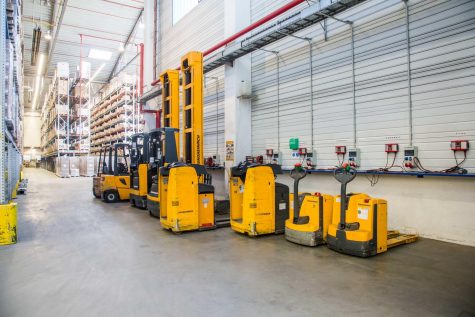
Rhenus operates a fleet of 24 electrically-powered forklift trucks. A central charging station is available for charging the traction batteries.
Energy efficiency core value
Energy efficiency and sustainability are core company values. “Be it optimising all our logistics processes, using LED lighting or investing in our own photovoltaics system, we are doing everything we can to reduce our energy consumption and in turn our CO2 emissions and operating costs,” says Silvio Kellenberger, head of the warehousing department at Rhenus Contract Logistics.
The site has a comprehensive environmental management system and is certified to ISO 14001. Rhenus is also a member of the Basel SME initiative, run by energy supplier IWB (Industrielle Werke Basel), the Energy Agency for the Economy (EnAW), the Basel Department of Environment and Energy (AUE) and the Basel trade association. This initiative seeks to help businesses to continuously increasing their energy efficiency and promotes the adoption of relevant improvement measures.
Enormous potential for savings
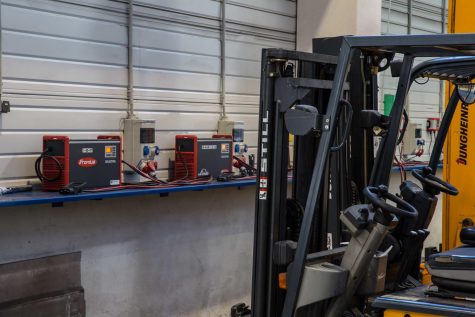
Since August 2015, Rhenus has been using innovative Selectiva battery charging systems from Fronius.
As part of the environmental management process, Rhenus took a closer look at its fleet of forklift trucks to discover that considerable savings could be made in terms of energy consumption and process efficiency.
The electrically-powered forklift trucks are driven by lead batteries, which are charged using a central charging station at the side of the hall. As the logistics centre does not employ a multi-shift operation, the forklift trucks do not have back-up batteries. “Previously there were fixed times at which we connected all the forklift trucks to the station for charging at the same time, irrespective of how full or empty the respective battery was,” recalls Kellenberger. “However, that was not particularly cost-effective.” In addition, the available technology was no longer up to date; some of the battery charging systems still relied on the old 50 Hz technology. This resulted in unnecessarily high energy costs and was partly responsible for the excessive overcharging of the batteries, which frequently caused the expensive lead batteries to reach the end of their useful life prematurely.
Increased efficiency charging process
When searching for a way to optimise the charging process, the managers at Rhenus Contract Logistics soon came across Fronius. The leader in battery charging technology with headquarters in Pettenbach, Upper Austria, has developed a solution for increasing the efficiency of the charging process and the service life of the traction batteries with the new generation of Selectiva devices.
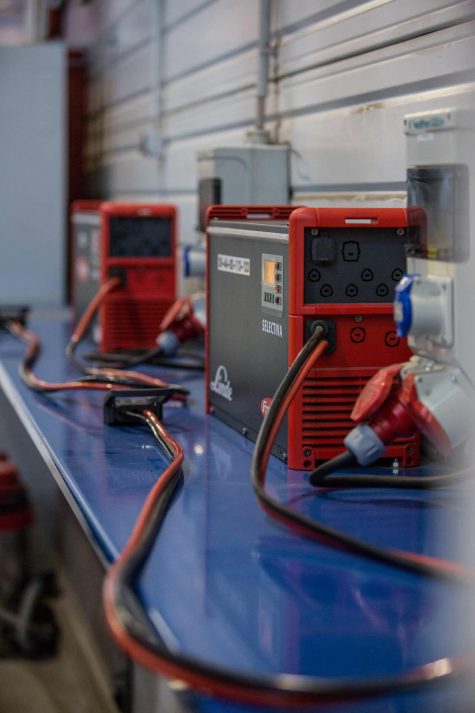
The Fronius devices with the new Ri charging process reduce energy consumption whilst increasing the service life of the traction batteries at the same time.
“The secret is the new Ri charging process, which adapts to each individual battery,” explains Reto Baumgartner, Sales Advisor for Battery Charging Systems at Fronius Switzerland. “The charging characteristic is determined by the battery’s effective inner resistance, which in turn is dependent on the age, temperature and state of charge of the battery.” This minimises the overcharging responsible for high energy losses and harmful warming of the battery, thereby reducing energy consumption and ensuring a longer service life.
Charging when required
Since August 2015, Rhenus has been using twelve Selectiva devices from Fronius, which have been a resounding success. “The compact design alone has made our charging station more visually appealing and much more modern,” says Kellenberger. And that’s not all. “We were also able to dramatically increase the efficiency of the charging process,” adds the warehouse manager. The devices (with an output of 1 to 8 kW) are flexible and can charge various types of battery. Forklift trucks and battery charging systems are numbered for straightforward assignment, which helps prevent errors. In addition to all this is a significant change: “The charging process now takes place as required, rather than at specific times,” reveals Kellenberger. “This means that we no longer need a battery charging system for each forklift truck; we actually need half as many.” At the same time, the availability of the forklift trucks has increased considerably – an important step in optimising processes at the logistics centre.
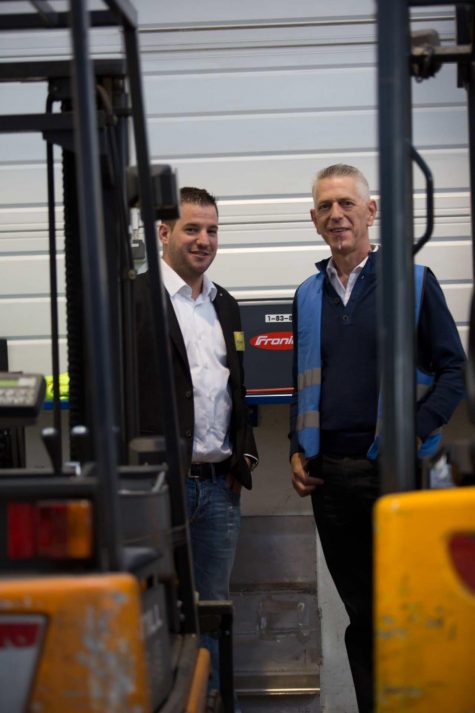
“With technology from Fronius, we were able to dramatically reduce the energy consumption of our forklift truck fleet.” Silvio Kellenberger (right), head of the warehousing department at Rhenus Contract Logistics, and Reto Baumgartner, Sales Advisor for Battery Charging Systems at Fronius Switzerland.
Kellenberger enthuses about the advantages of the Ri charging process: “Gentle charging has enabled us to dramatically reduce the energy consumption of our forklift truck fleet. The process also protects our batteries, which in turn extends their service lives.” This is evident from the operating costs, as the expensive traction batteries need to be replaced less often. The new technology is also much more reliable. “Previously, current peaks would always occur at the start of charging,” recalls Kellenberger. “This could even lead to fuses becoming overloaded, and if this goes unnoticed, charging will not take place.” However, this problem is now a thing of the past thanks to the Fronius devices. Rhenus has also been able to continue using the existing fuses, reducing installation work considerably.
Important step towards increased efficiency
In addition to lowering the energy costs, this new battery charging technology has also reduced the workload. The clear and flexible system simplifies operation, resulting in noticeable time savings. The gentle charging process also reduces the amount of water lost from the batteries, meaning that employees do not have to top them up as often. This has allowed Rhenus to take an important step towards greater efficiency in the logistics centre. “The Fronius devices help us to meet the high demands that we place on ourselves with our ISO certification and membership of the Basel SME initiative,” says warehouse manager Kellenberger.
Tags:
Batteries, Battery, Charging, Efficiency, Energy, Energy efficiency, Fronius, Rhenus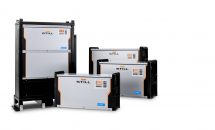
Fronius has been hard at work developing alternative dr...
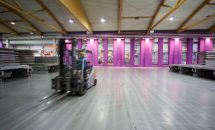
AMAG Austria Metall, Austria’s largest aluminium smel...

During CeMAT 2018, Fronius presented solutions for char...